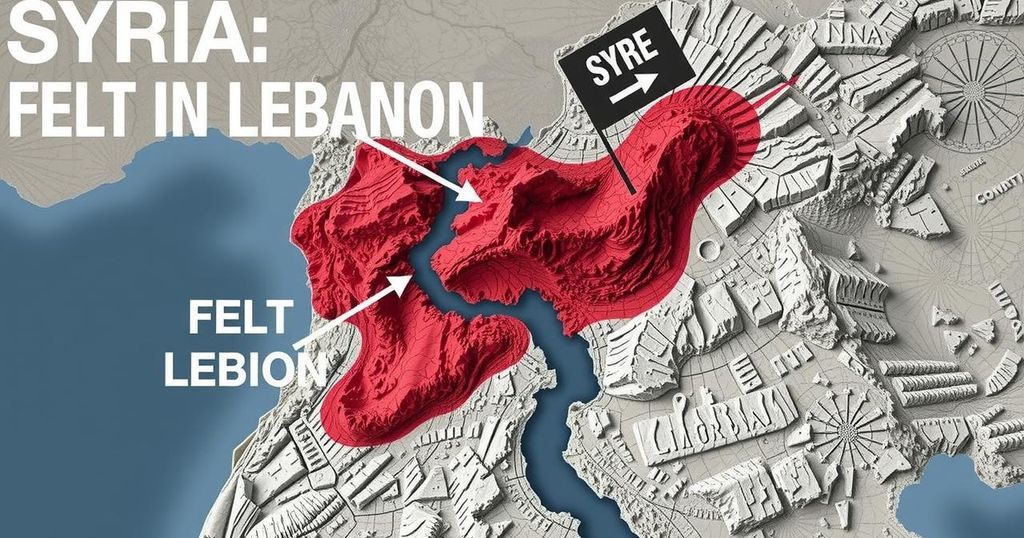Global news
AFRICA, AHMAD SHEMALI, AMAL, ASIA, ASSAD, BEIRUT, CEASEFIRE, CONFLICT, HEZBOLLAH, ISLAMISTS, ISRAEL, JAMAAH ISLAMIYA, JOSEPH AOUN, LEBANON, LIBYA, MIDDLE EAST, NA, NORTH AMERICA, ROUMIEH, SHEIKH AHMAD SHEMALI, SHIITE AMAL MOVEMENT, SIDON, SYRIA, TAHRIR AL - SHAM, TERRORISM, TRIPOLI, UNITED STATES
Isaac Bennett
0 Comments
Syria’s Earthquake Shakes Lebanon: Sunni Awakening and Political Turmoil
The recent shifts in Syria have spurred a significant awakening among Lebanon’s Sunni communities, leading to increased protests demanding the release of Sunni prisoners and amnesty for Islamists. Hizbullah faces political challenges as it attempts to retain its influence. Meanwhile, tensions between various Lebanese factions reflect a turbulent political environment, with implications of instability likely to persist given Syria’s new Sunni regime.
The recent upheaval in Syria has engendered significant political unrest within Lebanon, particularly among the Sunni communities that celebrate the diminishing influence of Assad’s regime. Dominated by Sunni Islamists, Lebanon’s response has been increasingly assertive, calling for the release of Sunni prisoners from state facilities, some of whom have languished without trial. Led by Sheikh Ahmad Shemali, the December protests encapsulated a growing movement demanding amnesty for all Islamists and jihadists, spurred by the sense of newfound Sunni empowerment following Syria’s takeover by Tahrir al-Sham (HTS). This has contributed to a volatile political landscape in Lebanon, with Hizbullah struggling to maintain its authority amid intensified Sunni activism and Israeli pressures.
The dynamics now unfolding indicate that the Lebanese political system is in disarray. The Shiite community, especially Hizbullah, is grappling with internal pressures as its historical dominance wanes. The organization is further challenged by General Joseph Aoun’s ascendance within the military, who is favored by international support from the United States as a potential presidential candidate. This tension was exemplified in a recent meeting between Aoun and Hizbullah’s Wafiq Safa, wherein Aoun asserted that the army would enforce the ceasefire agreements, threatening Hizbullah’s arms caches, which exacerbates the already fraught political climate.
Meanwhile, the Christian factions in Lebanon are also facing fragmentation as they strive for a consensus candidate amid accusations of complicity with Hizbullah. Prominent leaders like Samir Geagea of the Lebanese Forces and Camille Chamoun of the Constitutional Bloc are attempting to unify the Christian vote in a system that has favored the Shiite-Sunni divide. This complex political theater is intensified as the Sunni community increasingly responds to the shifts in Syria, which has now transformed into a neighboring Sunni regime, raising fears of potential jihadist spillover into Lebanese territory as memories of past conflicts linger.
Amid these developments, Ahmad al Sharaa, the leader of the anti-Assad coalition, has pledged non-interference in Lebanon, expressing support for General Aoun should he ascend to the presidency. This willingness to maintain a non-intrusive stance from the Syrian side may placate immediate fears of instability. However, the long-term implications of a resurgent Sunni movement within Lebanon, in consonance with developments in Syria, remain uncertain and potentially destabilizing.
The political climate in Lebanon has been significantly influenced by the shifts in Syria, particularly following the apparent weakening of Assad’s regime. This context has kindled a resurgence of assertive movements within the Sunni community in Lebanon, often interconnected with the broader geopolitical dynamics of the region. Additionally, the internal Lebanese situation is characterized by a Shiite-Sunni rivalry, as well as the complex relationships between rival Christian political factions, all wrestling for influence amid a collapsing political consensus. As the Sunni community finds encouragement in a newly Sunni-ruled Syria, the fears of a destabilizing effect in Lebanon become a central concern for political stability and national security.
In conclusion, the evolving political situation in Syria has reverberated into Lebanon, inciting a proactive Sunni response and challenging the traditional dominance of Hizbullah. As both Sunni and Shiite factions reevaluate their strategies amid these changes, increasing instability may be anticipated. The potential for spillover effects from Syria to Lebanon underscores the intricate connections between their political landscapes, illustrating the heightened risks of renewed conflict as factions navigate the unfolding realities.
Original Source: www.jewishpress.com




Post Comment